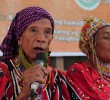MILF disarmament
But this formula will only succeed if, among other conditions, the MILF is finally disarmed and transformed into a mass-based political party thereby enhancing – in the language of the peace process – its legitimate political authority. It also depends on the cooperation and, more important, the political will of the Arroyo government even as, in the eyes of the USIP and other U.S. policy strategists, it is weak and incapable of delivering peace and development in the Moro communities (3). In the post-conflict scenario, it is almost inevitable for the U.S. with its military presence in Mindanao to head an international mission to guarantee the security of a new Bangsamoro.
The cooperation of the Arroyo regime and the MILF in this new peace formula is assured by internationalizing the peace process – the icing on the cake, so to speak. Supportive of the “peace and development” policy for Mindanao, a coalition of donor countries led by the U.S., Japan as well as the World Bank is committed to fund the Bangsamoro’s economic reconstruction. Aside from infusing 60 percent of its economic assistance to the Philippines in Mindanao, the USAID has committed a multi-year Mindanao Peace and Development Agreement worth $190 million and increased its economic support fund (ESF) to 25.9 million US dollars. Japan, besides joining the International Monitoring Team (IMT), has committed 400 million US dollars in Mindanao. Japan, which is also the U.S.’ chief security partner in East Asia, is working closely with the MILF’s development arm, Bangsamoro Development Agency. Similar commitments have come from Canada, Australia, Malaysia, Libya, and the OIC.
Cold war
Peace process as a paradigm finds its birth in the 1970s when it was coined by U.S. policy strategists to reduce tensions between Israel – a U.S. ally – Egypt, and Syria following the 1973 Yom Kippur war. The first peace process involving Israel and Egypt was choreographed by Richard Nixon and Henry Kissinger, considered dean of the realist diplomacy, as part of their d�tente strategy for winning the cold war in the Middle East. While there had been agreements forged, the process itself – hyped as the “roadmap to peace” – has been incremental for 40 years. Meantime, while tensions have aggravated in the Middle East today, the net effect of this peace process, among others, has included the rise of Israel as a nuclear power occupying a major swathe of the Palestinian land claim, the taming of the Palestine Liberation Organization by giving it a symbolic political authority, and a pro-U.S. Egypt.
After the cold war, peace process has been introduced in several flashpoints in the world including Northern Ireland, Sudan, Sri Lanka, Nepal, Aceh, East Timor, Bougainville, Kosovo, Kenya, the Basque region in Spain, and now, in Mindanao. As a politico-diplomatic track adopted in the global anti-terrorist war, peace process is the entry point for the U.S. purportedly to bring stability and governance in so-called “ungoverned” and “contested” territories such as Mindanao followed by a post-conflict program of international aid and security guarantee.
Global capitalism
The major political-economic goal of the peace process is to extend and embed market-driven global capitalism in these areas. A British scholar, Jan Selby, notes that the peace process is more of “a stalling mechanism for the powerful” whose central purpose “is to forestall radical or revolutionary political change” as well as to “reconsolidate hegemony and/or legitimacy.” Meanwhile, this peace formula has given birth to a global “peace industry” that involves multilateral agencies, think tanks, academic consultant groups, corporate investors, media, and elite stakeholders.
In Mindanao, the USIP itself anticipated that the MoA-AD would face strong legal and constitutional resistance and predicted Arroyo’s lack of capability in pushing the peace process to the end. Indeed the draft agreement has lit a wildfire of resistance from powerful non-Muslim politicians and landlords who have threatened war against the MILF unless it is shelved. How to bring stability and governance that would make the MILF the political authority which is only possible if the Muslim sultans and non-Muslim oligarchs disengage from dominant power politics is a daunting task.
This underscores the inherent failure of the peace process – the reason why, according to Selby – the whole exercise, which involves deliberate, well-calibrated long and tedious phases, does not provide substantial basis for sustainable, lasting peace. But if the net effect – which appears to be an underlying motive in the “peace process” – is to at least pacify a rebel army toward its eventual capitulation or accepting an exit strategy from war, then that itself can be claimed as an accomplishment by the peace architects.










